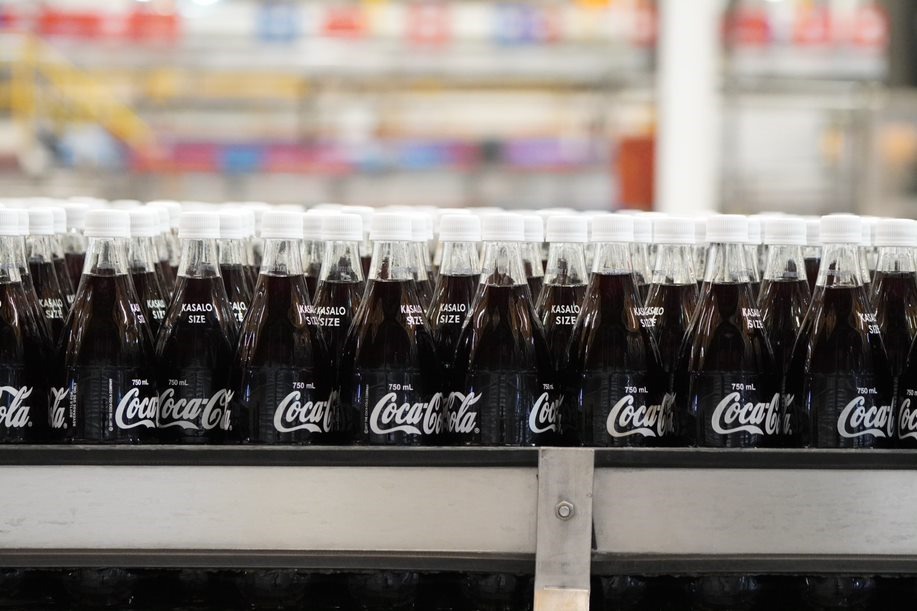
MANILA, 08 October 2020 – Coca-Cola is committed to growing its business the right way and not just the easy way. In keeping with this principle, the Company has been implementing and working on various initiatives that contribute to the achievement of global sustainability goals—in water, energy, women empowerment, and packaging. Coca-Cola remains especially passionate about ecological protection and preserving communities through the responsible management of its environmental footprint, even as it continues to reach and refresh more consumers throughout the world.
In 2010, Coca-Cola set out to reduce the carbon footprint of “the drink in your hand” by 25 percent in ten years. This means reducing carbon emissions throughout its value chain—from the procurement of raw materials, to manufacturing and use of sustainable packaging, to fleet management, and to continuous innovations ensuring improved performance of refrigeration equipment.
In the Philippines, Coca-Cola is definitely on track to achieve its energy efficiency goals throughout its operations, with the end in view of further reducing its carbon footprint.
“We are very conscious of our environmental footprint as an organization, especially with our scale, which is why we have comprehensive strategies in place to manage our impact on the environment,” says Gareth McGeown, President and CEO of Coca-Cola Beverages Philippines, Inc. “Across the Philippines, we have 19 plants and over 70 distribution offices, and sustainability is an integral component to the way we operate. We believe that business growth and sustainability are complementary to each other.”

Less energy, more beverages
Through energy savings initiatives that aim to increase energy efficiency, Coca-Cola Beverages Philippines, Inc.—the bottling arm of Coca-Cola in the Philippines—has been able to reduce its energy consumption even as it expands its production capacity. This means that the company is producing more beverages while using less power.
CCBPI’s Energy Use Ratio (EUR), or the amount of energy used in manufacturing its beverages, has significantly improved over the years. To date, the company has been able to improve its EUR by 30% since 2014. Initiatives to achieve this goal include optimizing operating systems for leak and steam management, instituting standard operating procedures for machines and heavy equipment, and employing world-class technologies that are energy efficient.
Renewable energy used to manufacture beverages
To date, seven out of Coca-Cola’s 19 manufacturing sites have made renewable and clean sources of energy a crucial part of their operations—namely, Sta. Rosa, Canlubang, Ilocos, (Calasiao) Pangasinan, Cebu, San Fernando in Pampanga, and Meycauayan. As such, 65% of Coca-Cola’s total energy consumption in its Philippine operations is being sourced from renewable energy.
The benefits of environmental sustainability to the Company’s growth and to the industry are apparent. The Canlubang Plant, which is home to the fastest bottling line of Coca-Cola in the world, is run on 100% renewable energy (RE); RE was first integrated into the Canlubang operations on February 2018. Since 2010, the bottling plant in Calasiao, Pangasinan has been using a biomass boiler which utilizes rice hulls instead of petroleum for fuel, in order to address a significant portion of its power requirements.
These achievements are only the beginning of a wide-reaching transition to using clean energy more prevalently in its operations. McGeown says, “We are going beyond what we’ve already accomplished because sustainability is a continuous journey.”
Last November 2019, CCBPI announced that approximately 10,000 solar panels will be installed in its plants in Bacolod and Misamis Oriental—a similar project is currently underway in its Davao del Sur manufacturing facility.
Sustainable fleet management
Coca-Cola operates one of the largest fleets in the country, with almost 3,000 trucks and over 2,000 sales service vehicles. With its vast logistics capabilities, approximately 2,500 shipments per day are made, transporting Coca-Cola beverage products to over 20,000 doors across the country. For operations this massive in scale, the Company ensures delivery of quality products to consumers through safe and reliable vehicles. Its newly acquired trucks and employee service vehicles are all Euro IV- to V-compliant engines that produce cleaner emissions while providing more power and fuel efficiency.
“We are proud of everything we’ve achieved in the Philippines, and Filipinos have our full commitment that we will continue securing more milestones in our sustainability roadmap,” says McGeown. “We’ve been in the Philippines for 108 years, and we plan to continue to build off this rich heritage. To make this happen, we are making sure that we continue to evolve as a company—and staying true to our sustainability goals.”
###
About Coca-Cola in the Philippines Coca-Cola has been refreshing Filipinos and making a difference in the Philippines for 108 years. The Philippines was Coca-Cola’s first market in Asia to begin local bottling operations. Today, the Coca-Cola system in the Philippines has evolved into a total beverage company, offering 19 brands in its beverage portfolio and employing over 10,000 Filipinos in over 19 manufacturing facilities and more than 70 distribution centres nationwide. As part of its long-standing commitment to the country, Coca-Cola continues to #GOBEYONDGOOD as a business by continuously supporting water replenishment programs in over 180 communities, empowering over 200,000 women entrepreneurs through training and peer mentoring, and accelerating packaging collection and recycling under its global World Without Waste initiative
